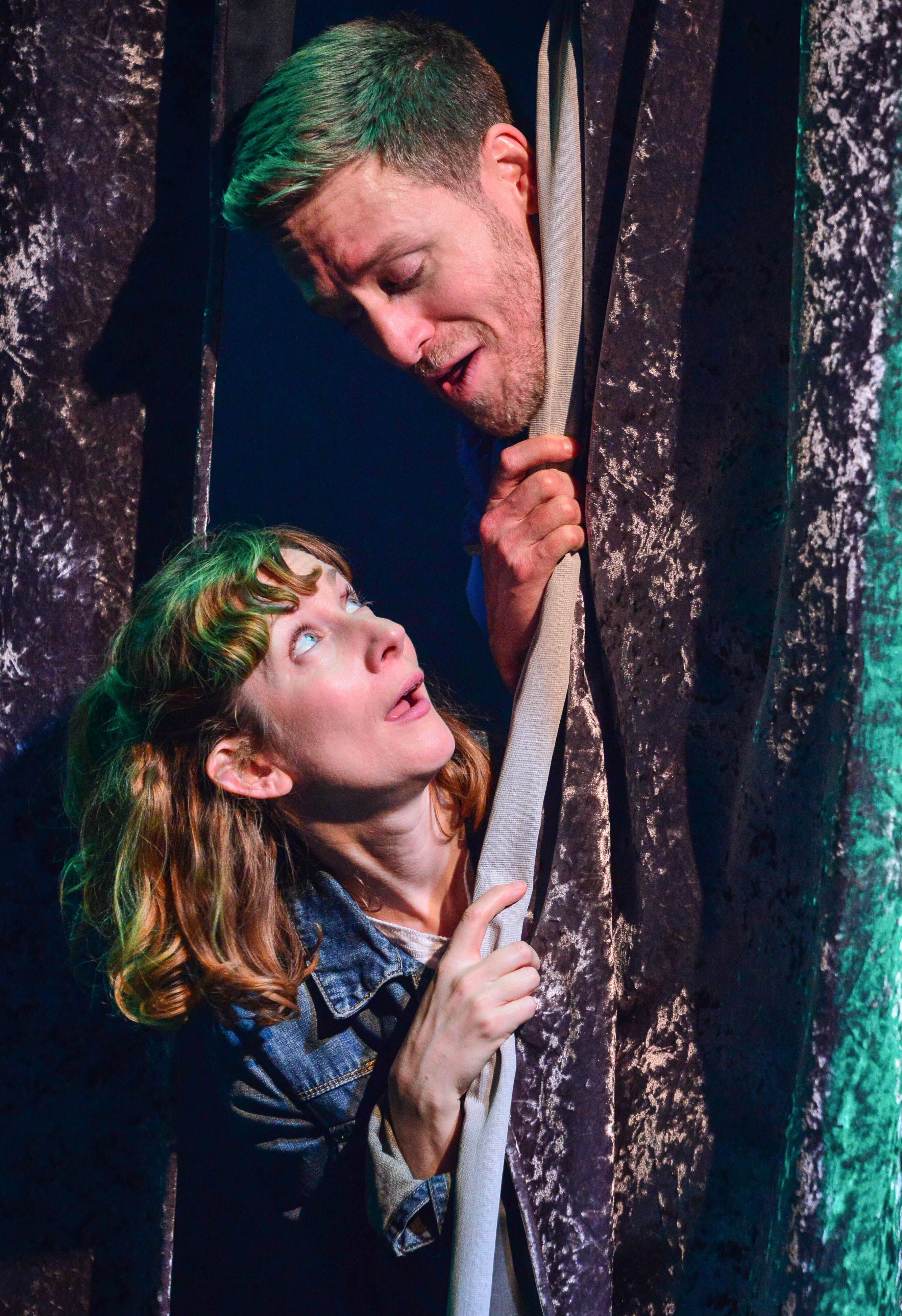The Art of Illusion, Hampstead Theatre review - a hit from Paris conjures up strange-but-true stories | reviews, news & interviews
The Art of Illusion, Hampstead Theatre review - a hit from Paris conjures up strange-but-true stories
The Art of Illusion, Hampstead Theatre review - a hit from Paris conjures up strange-but-true stories
A cast with an infectious gift for fun give this French confection a touch of stage magic

First came Yasmina Reza’s 1994 long-runner Art; now another French hit, The Art of Illusion, has arrived after eight years in Paris. The two pieces couldn’t be more different: the former is a chatty spat between three sophisticated male friends (would producers use gender-fluid casting these days?); the new arrival, a larky, boisterous ensemble piece that plays with the theme of illusion and how much it contributes to what we have come to call “magic”.
Thematically it’s stretched a little thin at times, but as a performance it’s a tonic. Its writer, Alexis Michalik, juggles three different historical eras at once, sometimes two simultaneously. This requires a versatile cast of six to play multiple roles, some gender-flipped, typically signalled by a minor costume change – a hat, a skirt – or switch of accents. Before the action even begins, the audience have to decide whether the staff preparing the space are really staff. These are unusually flirty workers, who coyly peep through curtains and admonish the audience with knowing smiles. One, armed with a big broom (Rina Fatania, a force of nature who is excellent in all her roles), pretends to be a danger to the front row’s feet.
This warm, teasing rapport between cast and audience is built on throughout, as if we are at a cabaret where the aim is to have maximum fun. Audience participation isn’t called on, but you sense there would have been a rush if it had been. Running the show onstage is a sort-of MC (Martin Hyder), who weaves his way through the plots, as ageless as a vampire. “I am the spirit of entertainment,” he announces in one of his incarnations. Inventively running the show in a bigger sense is director Tom Jackson Greaves, working to a translation by Waleed Akhtar.
 But two of the characters here are real historical figures from the 19th century. First up is the illusionist Jean Robert-Houdin (Kwaku Mills), born in 1805. He started out as a watchmaker but combined his mechanical skills with his love of leger de main and diversified into making automata, including a chess-playing Turk who never lost a game. The cast re-enact the story behind this trick, which involves a trip to Poland in the early 18th century. Houdin would become the model for the modern magician, sporting top hat, black tie and tails as he cheerily cut his assistants in half. (Harry Houdini saluted his influence by adopting his surname.)
But two of the characters here are real historical figures from the 19th century. First up is the illusionist Jean Robert-Houdin (Kwaku Mills), born in 1805. He started out as a watchmaker but combined his mechanical skills with his love of leger de main and diversified into making automata, including a chess-playing Turk who never lost a game. The cast re-enact the story behind this trick, which involves a trip to Poland in the early 18th century. Houdin would become the model for the modern magician, sporting top hat, black tie and tails as he cheerily cut his assistants in half. (Harry Houdini saluted his influence by adopting his surname.)
The second real figure (played by Norah Lopez Holden) is Georges, the son of a bootmaker, who hankers after a career as a painter and one day stumbles upon the remains of Robert-Houdin’s little cellar theatre. There he begins to create his own illusions, to small audiences. But huge success comes later, when he discovers “the perfect illusion” – a way to tell a story that moves.
When suddenly we discover Georges’ surname is Méliès, a key piece in this puzzle play falls into place – assuming you are a fan of early cinema in France and his pioneering role in it. Michalik is examining what thrills us in art: why it doesn’t matter if it’s “just” an illusion.
To add contemporary ballast to the Houdin/Méliès plots, he adds the rather fanciful story of a young couple who meet when he returns her bag to her, retrieved by him from a métro platform. It’s 1984, and France are making progress in the Euros, their games heard in bursts on various radios. But how does this couple’s story fit in with the other two narratives? Did the woman, April (Bettrys Jones), really lose the bag? Is the man, December (Brian Martin), a bona fide mechanic? When they find a derelict cellar theatre under the bank where April works as a designer of safety deposit boxes (really?), no prizes for guessing whose it is. And that's not the last of the final twists. (Pictured above, Bettrys Jones, Brian Martin)
When the various plot strands meet up for a grand finale, the confected modern one doesn’t sit so well with the historical ones. But by this time you will have decided either that this is 100 minutes of Gallic whimsy, or, more likely, as most people there did, that you have had a fast-moving evening being thoroughly entertained by an impressive cast.
The future of Arts Journalism
You can stop theartsdesk.com closing!
We urgently need financing to survive. Our fundraising drive has thus far raised £49,000 but we need to reach £100,000 or we will be forced to close. Please contribute here: https://gofund.me/c3f6033d
And if you can forward this information to anyone who might assist, we’d be grateful.

Subscribe to theartsdesk.com
Thank you for continuing to read our work on theartsdesk.com. For unlimited access to every article in its entirety, including our archive of more than 15,000 pieces, we're asking for £5 per month or £40 per year. We feel it's a very good deal, and hope you do too.
To take a subscription now simply click here.
And if you're looking for that extra gift for a friend or family member, why not treat them to a theartsdesk.com gift subscription?
more Theatre
 Ragdoll, Jermyn Street Theatre review - compelling and emotionally truthful
Katherine Moar returns with a Patty Hearst-inspired follow up to her debut hit 'Farm Hall'
Ragdoll, Jermyn Street Theatre review - compelling and emotionally truthful
Katherine Moar returns with a Patty Hearst-inspired follow up to her debut hit 'Farm Hall'
 Troilus and Cressida, Globe Theatre review - a 'problem play' with added problems
Raucous and carnivalesque, but also ugly and incomprehensible
Troilus and Cressida, Globe Theatre review - a 'problem play' with added problems
Raucous and carnivalesque, but also ugly and incomprehensible
 Clarkston, Trafalgar Theatre review - two lads on a road to nowhere
Netflix star, Joe Locke, is the selling point of a production that needs one
Clarkston, Trafalgar Theatre review - two lads on a road to nowhere
Netflix star, Joe Locke, is the selling point of a production that needs one
 Ghost Stories, Peacock Theatre review - spirited staging but short on scares
Impressive spectacle saves an ageing show in an unsuitable venue
Ghost Stories, Peacock Theatre review - spirited staging but short on scares
Impressive spectacle saves an ageing show in an unsuitable venue
 Hamlet, National Theatre review - turning tragedy to comedy is no joke
Hiran Abeyeskera’s childlike prince falls flat in a mixed production
Hamlet, National Theatre review - turning tragedy to comedy is no joke
Hiran Abeyeskera’s childlike prince falls flat in a mixed production
 Rohtko, Barbican review - postmodern meditation on fake and authentic art is less than the sum of its parts
Łukasz Twarkowski's production dazzles without illuminating
Rohtko, Barbican review - postmodern meditation on fake and authentic art is less than the sum of its parts
Łukasz Twarkowski's production dazzles without illuminating
 Lee, Park Theatre review - Lee Krasner looks back on her life as an artist
Informative and interesting, the play's format limits its potential
Lee, Park Theatre review - Lee Krasner looks back on her life as an artist
Informative and interesting, the play's format limits its potential
 Measure for Measure, RSC, Stratford review - 'problem play' has no problem with relevance
Shakespeare, in this adaptation, is at his most perceptive
Measure for Measure, RSC, Stratford review - 'problem play' has no problem with relevance
Shakespeare, in this adaptation, is at his most perceptive
 The Importance of Being Earnest, Noël Coward Theatre review - dazzling and delightful queer fest
West End transfer of National Theatre hit stars Stephen Fry and Olly Alexander
The Importance of Being Earnest, Noël Coward Theatre review - dazzling and delightful queer fest
West End transfer of National Theatre hit stars Stephen Fry and Olly Alexander
 Get Down Tonight, Charing Cross Theatre review - glitz and hits from the 70s
If you love the songs of KC and the Sunshine Band, Please Do Go!
Get Down Tonight, Charing Cross Theatre review - glitz and hits from the 70s
If you love the songs of KC and the Sunshine Band, Please Do Go!
 Punch, Apollo Theatre review - powerful play about the strength of redemption
James Graham's play transfixes the audience at every stage
Punch, Apollo Theatre review - powerful play about the strength of redemption
James Graham's play transfixes the audience at every stage
 The Billionaire Inside Your Head, Hampstead Theatre review - a map of a man with OCD
Will Lord's promising debut burdens a fine cast with too much dialogue
The Billionaire Inside Your Head, Hampstead Theatre review - a map of a man with OCD
Will Lord's promising debut burdens a fine cast with too much dialogue

Add comment